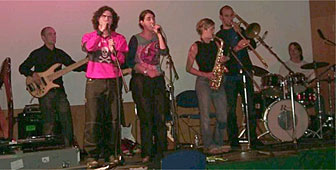New CD proves Romansh can be rock and roll

A new CD combines the musical and cultural traditions of Switzerland's fourth national language, Romansh, with those of Scotland and Ireland.
The album, released this month, is the result of an eighteen-month project coordinated by the British Council in Switzerland to mark the European Year of Languages.
Musicians drawn from Switzerland’s tiny community of Romansh speakers, together with vocalists and performers from Ireland and Scotland, came together to write, perform and record a 15-track album of music in their traditional languages.
Caroline Morrissey, director of the British Council in Switzerland, told swissinfo the aim of the project was to use music as a means of demonstrating the vibrancy and relevance of minority languages today.
“We wanted to do something to celebrate the European Year of Languages,” Morrissey said.
“So we looked at the lesser used languages of the United Kingdom and Switzerland, and this is how we came up with the project,” she added.
Fusion of traditions
The result is a unique fusion of three different languages, cultures and musical traditions.
Ten Romansh-speaking Swiss musicians together with a similar number of Irish and Scottish songwriters spent four days on the Isle of Skye off the coast of Scotland, composing and rehearsing songs.
“We rehearsed all day every day and just put everything together and hoped for the best,” says Belfast-based guitarist Caoimhin MacGiolla Cathain.
Swiss drummer Jan Sedlacek told swissinfo the first challenge the group had to overcome was how to settle into a daily song writing routine.
“There were different cultures and different ways of working,” Sedlacek said.
“The most difficult part of this project was the fact that the musicians were not only playing [their instruments] differently, but also working differently, ” agreed fellow Swiss musician, Ramun Knapp.
Though the group bonded quickly and worked well together, Cathain says, one cultural obstacle proved a little more difficult to overcome.
“The Swiss were always on time, and the Irish and Scots were waking up with hangovers,” he recalled.
“So we set a timetable on one of the days where the Irish and Scots would come in at lunchtime and the Swiss were there in the morning.”
Furthering cultural understanding
All the musicians who took part in the project agreed the creative process was an opportunity to learn about the language and traditions of other cultures.
“I didn’t know Romansh even existed before working on this,” Cathain admitted.
“So it was a great opportunity. Normally when you’re singing in minority languages, it’s folk music, so it was good to bring it out into modern rock music.”
The group made the collective decision not to produce an album of traditional folk songs, but to focus instead on composing original tracks in a predominantly upbeat, rock-and-roll style.
Many of the songs contain lyrics from all three linguistic traditions, while others focus on one minority language.
The title chosen for the finished album – “Cara” – expresses the group’s vision of a musical fusion of culture and language.
“The word ‘Cara’ in Gaelic means ‘friend’ and in Romansh it means ‘dear one’,” explains Cathain.
“So it was interesting that we found a word for the title in both languages which more or less expressed the same thing.”
by Ramsey Zarifeh

In compliance with the JTI standards
More: SWI swissinfo.ch certified by the Journalism Trust Initiative
You can find an overview of ongoing debates with our journalists here. Please join us!
If you want to start a conversation about a topic raised in this article or want to report factual errors, email us at english@swissinfo.ch.